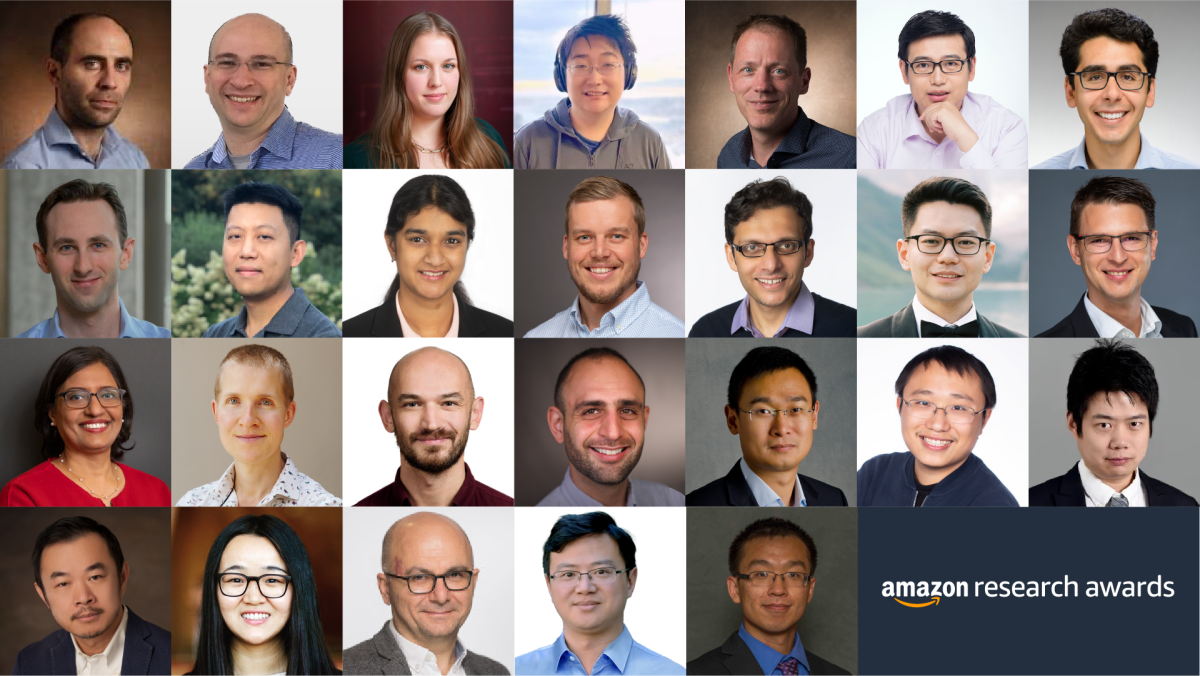Amazon Research Awards (ARA) provides unrestricted funds and AWS Promotional Credits to academic researchers investigating various research topics in multiple disciplines. This cycle, ARA received many excellent research proposals from across the world and today is publicly announcing 29 award recipients who represent 25 universities in seven countries.
This announcement includes awards funded under five call for proposals during the spring 2022 cycle: AI for Information Security, Alexa – Fairness in AI, Amazon Advertising, Amazon Science Community and Machine Learning University, and AWS AI: Human-in-the-loop machine learning and annotation.
Proposals were reviewed for the quality of their scientific content and their potential to impact both the research community and society.
Recipients have access to more than 300 Amazon public datasets and can utilize AWS AI/ML services and tools through their AWS Promotional Credits. Recipients also are assigned an Amazon research contact who offers consultation and advice, along with opportunities to participate in Amazon events and training sessions.
Additionally, Amazon encourages the publication of research results, presentations of research at Amazon offices worldwide, and the release of related code under open-source licenses.
“Scientists and engineers are at their best when they’re inventing on behalf of customers," said Brent Werness, manager of applied science with Machine Learning University. "But how does that invention happen? And what can we do to help scientists and engineers do their best work? Answering these questions requires a sustained, interdisciplinary research agenda, and our 2022 Amazon Research Award recipients will take one more step toward understanding.”

ARA funds proposals two times a year in a variety of research areas. Applicants are encouraged to visit the ARA call for proposals page for more information or send an email to be notified of future open calls.
The table below lists, in alphabetical order, spring 2022 cycle call-for-proposal recipients.
Recipient |
University |
Research title |
Vardan Avagyan |
Erasmus University Rotterdam |
Role of consumer mindset metrics in optimal ad decisions |
Yakov Bart |
Northeastern University |
Using video summarization for generating effective short video ads |
Amrit Singh Bedi |
University of Maryland, College Park |
Ensuring fairness via federated learning beyond consensus |
Stevie Chancellor |
University of Minnesota, Twin Cities |
Collaborative and socially translucent task instructions for emotionally heavy and subjective annotation tasks |
Muhao Chen |
University of Southern California |
On faithfulness of information extraction |
Bas Donkers |
Erasmus University Netherlands |
Real-time personalization in dynamic environments |
Chuang Gan |
UMass Amherst |
Auto-labeling through neuro-symbolic learning for visual and text data |
Diego Gomez-Zara |
University Of Notre Dame |
Creating and designing disruptive teams: Experiments and models for assessing teams’ disruption |
Pallassana (P. K.) Kannan |
University of Maryland College Park |
Measuring the synergy across marketing touchpoints using transformers |
Omer Levy |
Tel Aviv University |
Explaining and mitigating adverse biases in large language models via natural language instructions |
Zhou Li |
University Of California, Irvine |
Accurate, scalable and robust attack provenance on discrete temporal graph |
Dinesh Manocha |
University of Maryland, College Park |
Ensuring fairness via federated learning beyond consensus |
Vidya Muthukumar |
Georgia Institute of Technology |
Framework for learning from online bidding |
Gijs Overgoor |
Rochester Institute Of Technology |
Using video summarization for generating effective short video ads |
Ashwin Pananjady |
Georgia Institute of Technology |
Framework for learning from online bidding |
Xiao Qiao |
City University of Hong Kong |
Predicting successful scientific collaborations |
Christian Schlereth |
WHU Germany Otto Beisheim School of Management |
The power of the climate friendly badge |
Shuba Srinivasan |
Boston University |
Role of consumer mindset metrics in optimal ad decisions |
Damien Teney |
Idiap Research Institute |
Addressing underspecification for improved fairness and robustness in conversational AI |
Misha Teplitskiy |
University of Michigan |
Learning by reviewing |
Berk Ustun |
University of California, San Diego |
Participatory personalization in machine learning |
Dashun Wang |
Northwestern University |
Creating and designing disruptive teams: Experiments and models for assessing teams’ disruption |
Xiaolong Wang |
University of California, San Diego |
Open world object discovery and tracking with grouping vision transformers |
Yang Weng |
Arizona State University |
Reinforcement learning twins: granular level recommendations with causal interpretations on amazon assortment via limited tests |
Eric Xing |
Carnegie Mellon University |
A faster and more accurate secure model serving framework on the cloud |
Diyi Yang |
Stanford University |
Human-in-the-loop for long text generation |
Gokhan Yildirim |
Imperial College London |
Role of consumer mindset metrics in optimal ad decisions |
Heng Yin |
University of California, Riverside |
Next-generation AI-powered binary diffing |
Hanzhe Zhang |
Michigan State University |
Predicting successful scientific collaborations |

















